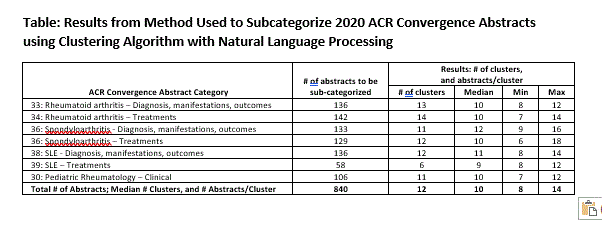Session Information
Session Type: Poster Session C
Session Time: 8:30AM-10:30AM
Background/Purpose: Expanding scientific discovery has resulted in increased challenges to organize and categorize medical knowledge. Dozens or hundreds of abstracts are submitted each year to more than 40 American College of Rheumatology (ACR) Convergence Annual Meeting Abstract Submission Categories. Numerous ACR abstract review teams then are charged to group similar types of abstracts into the many poster and oral sessions (i.e. subcategories), to be presented across Convergence meeting days. This manual process of grouping relies on subject matter expertise to identify similar content across abstracts and is exceedingly time consuming. We developed and implemented an automated approach to sub-categorize similar abstracts within each ACR Abstract Submission Category to increase the efficiency of the grouping process.
Methods: The corpus of all accepted abstracts to seven of the largest 2020 ACR Convergence Abstract Categories was parsed and processed using natural language processing (NLP) tools from the National Library of Medicine. After filtering stop words, parsing the data, and applying n-grams for tokenization, a bag of words approach was used to identify all terms and multi-word concepts in both the title and body of all abstracts. We counted term and concept frequencies, weighted by the inverse of their frequency across all abstracts. Concepts also were tagged with their semantic type using UMLS. K-means clustering was used to derive abstract category subclusters, optimizing the cluster convergence criterion (CCC) metric to identify the optimal number of subclusters (i.e. abstract session subcategories). An iterative, automated approach subsequently was applied that required the clustering algorithm to select the next number of clusters (also based on the CCC) if the first solution did not meet constraints defined by varying parameters on the size of the subcategories (i.e. min/max number of clusters, and the min/max number of abstracts per cluster).
Results: A total of 840 abstracts distributed across 7 ACR 2020 Convergence categories were analyzed and yielded 156,778 unique concepts derived from 24,990 unique terms. For each of the 7 Abstract Submission Categories and with no constraints applied, the method yielded 6 – 14 subcategory clusters. The min and max number of abstracts per cluster subcategory ranged from 6 – 18 (Table). Applying additional constraints on both the number of clusters and min/max number of abstracts per cluster yielded convergence within 1-4 iterations.
Conclusion: Clustering methods combined with NLP tools has the ability to greatly reduce the time spent by ACR Convergence meeting review teams and has applicability to other scientific meetings to automatically subgroup abstracts into sessions or to pre-categorize them as a basis for further manual refinement.
To cite this abstract in AMA style:
Curtis J, Su y, Xie F, Clinton c, Pope J, Bykerk V, Saag K, Smolen J, Furst D, Davis L. NLP-Based Clustering Methods Can Efficiently Categorize Scientific Abstracts for Medical Conferences [abstract]. Arthritis Rheumatol. 2021; 73 (suppl 9). https://acrabstracts.org/abstract/nlp-based-clustering-methods-can-efficiently-categorize-scientific-abstracts-for-medical-conferences/. Accessed .« Back to ACR Convergence 2021
ACR Meeting Abstracts - https://acrabstracts.org/abstract/nlp-based-clustering-methods-can-efficiently-categorize-scientific-abstracts-for-medical-conferences/

